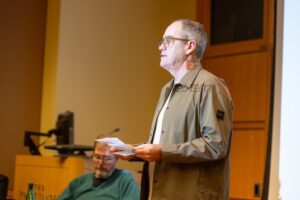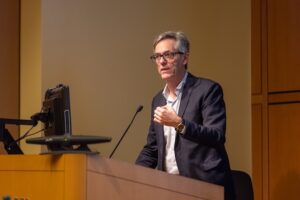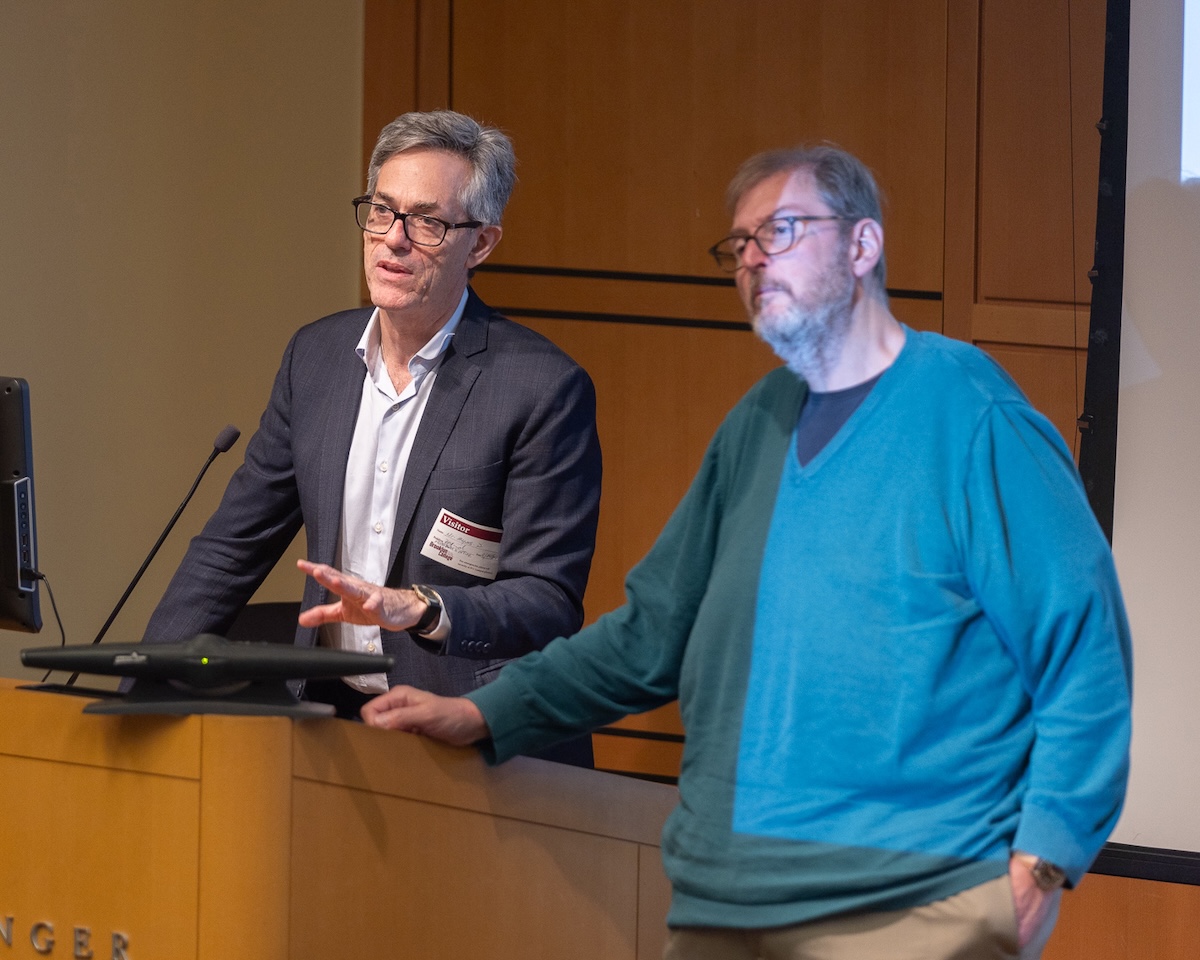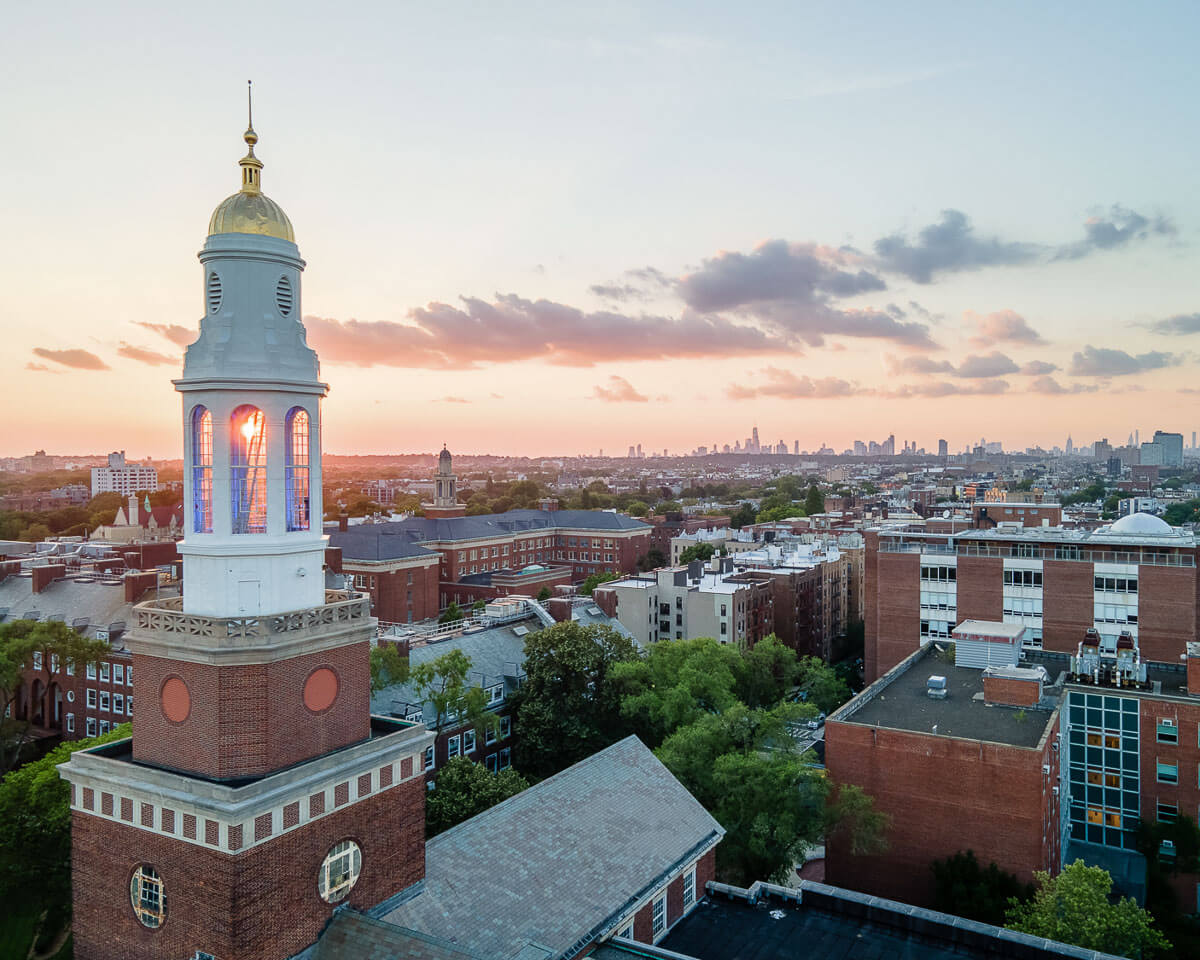In a thought-provoking co-presentation in the Tanger Auditorium on September 24, 2024, Hussein Ibish and David N. Myers captivated a diverse audience with their insights on the complex history and future of Israel and Palestine.
Their conversation, titled “How Did We Get Here and Where Can We Go? On the History and Future of Israel and Palestine,” was part of the We Stand Against Hate initiative that aims to foster dialogue and understanding around issues of discrimination, identity, and conflict. The lecture helped galvanize the extended college community toward meaningful engagement in the pursuit of justice and understanding.

Hussein Ibish
Ibish, a senior resident scholar at the Arab Gulf States Institute and a noted commentator on Arab-American issues, opened the discussion by navigating through the intricate historical landscape of the region. Drawing from his extensive research on discrimination and hate crimes, he acknowledged the emotional and political weight that the Israel-Palestine conflict carries, not only for those directly involved but for communities around the world. He emphasized the importance of understanding historical contexts to grapple with the current conflicts and to inspire future actions toward peace.
Ibish also highlighted pivotal events that led to the establishment of the Israeli state in 1948, the subsequent Arab-Israeli wars, and the ongoing struggles faced by Palestinian communities. He pointed out the critical moments that shaped perceptions and policies, illuminating how narratives of identity and belonging have been forged amid violence and division. As a contributor to platforms like The Atlantic, he iterated that the challenge is not merely a political one but a deeply human issue, urging attendees to engage with empathy for those affected.
Ibish’s presentation included discussions on key points including international accountability and enforcement on both parties; a framework for strengthening the Palestine Liberation Organization/Palestinian Authority; salvaging and leveraging Israeli-Saudi normalization; and competing models for self-determination.

David N. Myers
Myers, a distinguished professor of history at UCLA, the director of the UCLA Initiative to Study Hate, and an authority on Jewish history, complemented Ibish’s account with his expertise on the Jewish experience of this long-standing conflict. Myers drew connections between historical prejudices and contemporary discussions of identity, morality, and statehood. He posited that understanding history is critical to envisioning a future where mutual recognition and respect can thrive.
Some key points from Myers’ lecture included an immediate ceasefire and return of hostages and what might lie on the horizon, including self-determination for Palestinians. He also stressed the importance of addressing trauma, and having political imagination and courage.
Throughout the lecture, both speakers engaged in a dynamic dialogue about the prospects for peace in a region often marred by violence and discord. They discussed the failures of previous peace processes and the evolving political landscape, acknowledging that finding common ground is increasingly challenging. However, they expressed cautious optimism about grassroots movements that emphasize coexistence and mutual understanding as potential pathways toward resolution.
The audience of students, faculty, and community members participated in a Q&A session that followed. Attendees posed questions about the role of international actors, the influence of social media in shaping perspectives on the conflict, and the significance of educational initiatives in promoting tolerance. Ibish and Myers responded thoughtfully, emphasizing that change often begins at the community level and that education can be a powerful tool for fostering dialogue and empathy.
The We Stand Against Hate initiative aims to challenge rising hate speech and discrimination, particularly in academia and public discourse. By facilitating events like this one, Brooklyn College seeks to provide a platform for candid conversations that encourage critical thinking and promote an atmosphere of understanding among diverse perspectives. In a time when misunderstandings and hate can easily escalate, events like this We Stand Against Hate conversation serve as essential reminders of the power of discourse. More than just an academic exchange, it served as a call to action for individuals to engage in the difficult realities of our world while remaining committed to compassion, dialogue, and peace.
As the event concluded, attendees left with a renewed sense of purpose and understanding of the complexities surrounding the Israel-Palestine conflict. The expression of hope from both Ibish and Myers resonated throughout the audience, inspiring individuals to continue the conversation beyond the auditorium walls.



